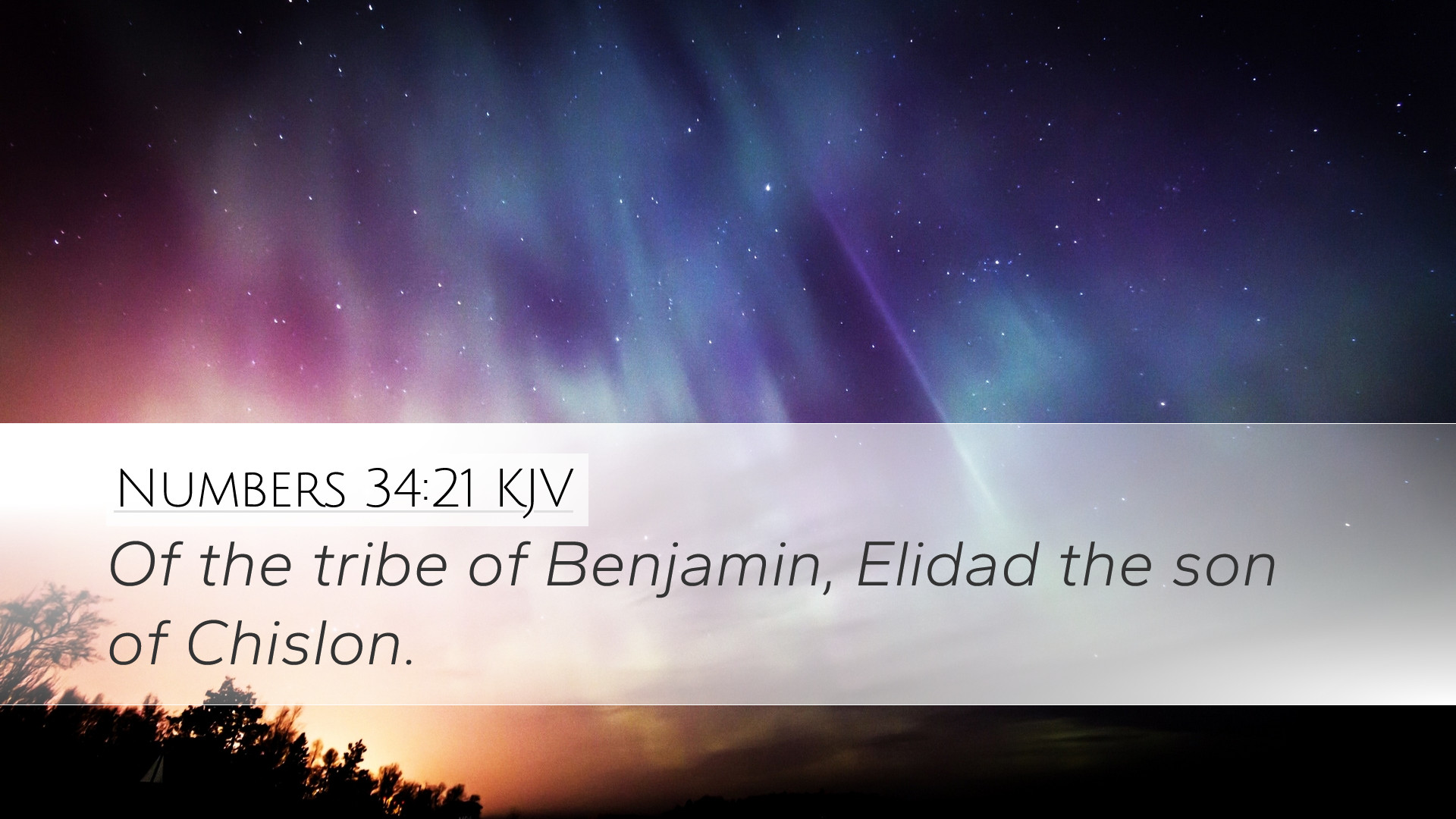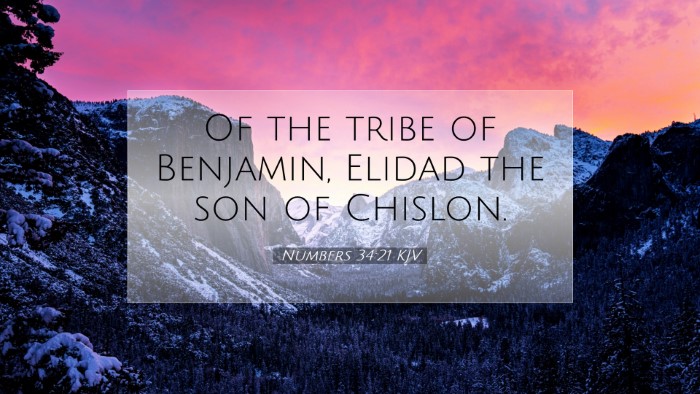Commentary on Numbers 34:21
Numbers 34:21 states: "And of the tribe of Benjamin, Elidad the son of Chislon." This verse is part of the Lord's instructions to Moses concerning the allotment of the Promised Land, detailing the leaders appointed from each tribe to help in this division. This passage provides insight both into Israel's leadership structure and the distribution of responsibilities among the tribes.
Contextual Background
The Book of Numbers primarily focuses on the Israelites' journey through the wilderness towards the Promised Land, with significant emphasis on the organization of the people, their laws, and their leaders. As the children of Israel stood on the brink of entering Canaan, it was vital for them to understand how their land would be divided amongst the tribes.
In this chapter, God outlines the geographical boundaries of Canaan and the leaders from each tribe who would be responsible for the distribution of territory. Elidad, as mentioned in the verse, represents the tribe of Benjamin, reflecting both the dignity of the tribe and its role in the overall structure of Israel's community.
Insights from Matthew Henry
Matthew Henry, in his commentary, emphasizes the importance of God's appointment in the selection of leaders for each tribe. He notes that Elidad, as one of the chosen leaders, signifies not only the honor bestowed upon the tribe of Benjamin but also God's providential guidance in the distribution of land.
- Leadership and Responsibility: Henry argues that leadership among the tribes is a divine appointment, reiterating that it is God who raises individuals to fulfill His purposes.
- The Tribe of Benjamin: This tribe is often considered one of the lesser tribes, and yet in this passage, its inclusion as part of the leadership demonstrates God's recognition of all tribes, great or small.
- Divine Order: Henry points out the significance of maintaining divine order and structure within the community, which serves parallel lessons for contemporary church governance and structure.
Insights from Albert Barnes
Albert Barnes offers a critical observation on the choice of Elidad and highlights the historical context of the tribe of Benjamin. He notes that this tribe, descended from Jacob’s youngest son, took on considerable significance in later biblical narratives, especially concerning Saul, the first king of Israel.
- Covenantal Relationship: Barnes emphasizes God's covenant with Israel, suggesting that the leaders chosen, including Elidad, are part of fulfilling God's promises to His people.
- Symbol of Hope: The mention of individual leaders serves as a reminder of hope and continuity within God’s plan for Israel, particularly for the smaller tribes that might feel overlooked.
- God's Sovereignty: The sovereignty of God is a recurring theme for Barnes, who insists that the divine selection of leaders is indicative of God’s direct involvement in the affairs of His people.
Insights from Adam Clarke
Adam Clarke, delving deeper into the meanings of names and the specific roles of the individuals mentioned, draws attention to the significance of Elidad’s character and background. Clarke implies that the attributes of leaders reflect the nature of their tribes.
- Name Significance: The name Elidad can be interpreted to mean "God is beloved," which Clarke suggests emphasizes the favor of God upon this leader and his tribe.
- Historical Context: Clarke reminds readers that the roles allotted to leaders were not mere formalities; they were crucial in the establishment of justice, order, and morality in early Israel.
- Lessons for Today: The leadership principles discussed can provide sound guidance for modern-day leaders, emphasizing the importance of divine guidance and moral integrity.
Theological Reflections
The selection of leaders such as Elidad indicates several theological concepts that can guide pastors, students, and theologians today:
- Divine Authority: Every leader must acknowledge that their authority comes from God. This realization fosters humility and a dependence on divine wisdom when making decisions.
- Community and Diversity: God's choice of a leader from Benjamin signifies the richness in diversity within the Christian community. Each member, regardless of background or stature, has a role to play in God's plan.
- Faithfulness in Service: Just as Elidad was chosen for his tribe, Christians must aspire to be faithful in their calling, recognizing that their service is a part of God's larger plan for His people.
Conclusion
In summary, Numbers 34:21, while seemingly a straightforward mention of a leader's name, carries significant weight regarding leadership, divine providence, and the community of believers. The insights from various public domain commentaries such as those by Matthew Henry, Albert Barnes, and Adam Clarke provide a rich tapestry of understanding that is beneficial to pastors, students, theologians, and Bible scholars alike.
The implications for modern faith communities are profound, reminding believers of the importance of recognizing God’s hand in leadership and the diverse roles that each individual plays within the body of Christ.


